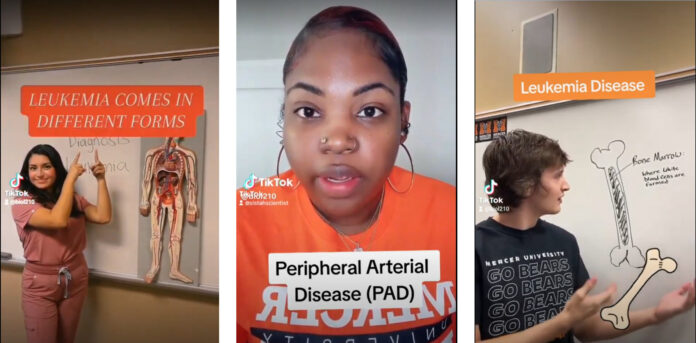
A class in Mercer University’s College of Professional Advancement is teaching students how they can leverage artificial intelligence and social media to create public health awareness campaigns.
Dr. Sabrina Walthall, professor of science, teaches BIOL 210: Biology of Disease each fall. As part of the course’s service-learning component, students create public awareness campaigns about various diseases. In the past, that involved displaying posters and pamphlets at the Henry County Regional Academic Center or creating infographics to post on the back of bathroom stall doors.
Last fall, Dr. Walthall decided to do something different. She had students harness the power of ChatGPT, a generative AI tool, and the social media platform TikTok to share their messages.
“In class, students discussed how social media, particularly platforms like TikTok, Instagram and Facebook, offers an expansive and dynamic stage for health advocacy,” she said. “These platforms enable advocates like themselves to share content with a vast audience, encouraging interaction, shares and likes.
“Now we’re not just educating the population of students that come to the Henry County campus, but now we’re educating the world.”
Working in groups, students chose a disease and used ChatGPT to help them write short-form video scripts. Because ChatGPT’s output is not always accurate, students had to fact check the content and provide at least three references for each video.
“I made sure that they understood that ChatGPT wasn’t just here for them to use as a freebie, but it was there as a template for them to now take this idea and evolve it in a way that fit their personalities and that gave accurate information,” Dr. Walthall said.
Each group produced three videos — one with music, one using a green screen and one talking to the viewer. The messages needed to be accurate, resonate with a diverse audience, and be fun and engaging, she said. Videos were published to the course’s TikTok page, @biol210.
Jasmine Moultrie, a pre-medical student who is pursuing a bachelor’s degree in health care leadership, was familiar with TikTok but hadn’t used ChatGPT prior to Dr. Walthall’s class. Going into the project, she was skeptical of AI because of its tendency to stereotype and make assumptions.
“But really it’s a tool. So now that I’ve done the class, I can implement ChatGPT (in the future),” she said. “The thing that I enjoyed most was the use of social media because typically we use it for entertainment, but there is a large percentage of the population that does use it for educational purposes.
“To be able to get information out there to people was the most satisfying for me.”
Dr. Walthall became interested in incorporating new technologies into her class after attending a College of Professional Advancement workshop about ChatGPT.
Many of her students are working adults, and she said it is important for them to keep up with new technology, so they can compete in the workforce.
“I entered college when the World Wide Web came to be, and I remember professors not understanding how it was going to change the way we researched and wrote papers.
Dr. Walthall said. “I see Chat GPT as that exciting frontier for this generation.”
At the end of the course, students received a social media health advocacy badge, which they may display on digital platforms to demonstrate their competence in the topic.








